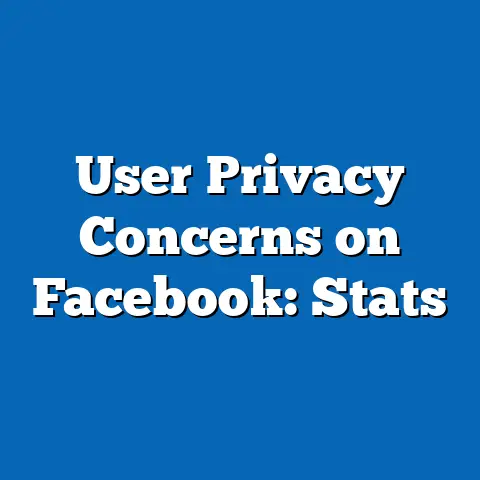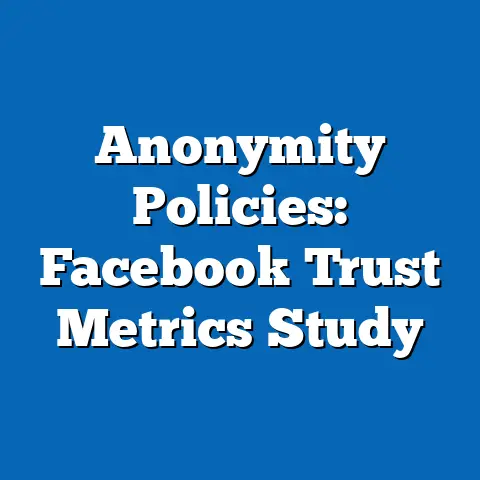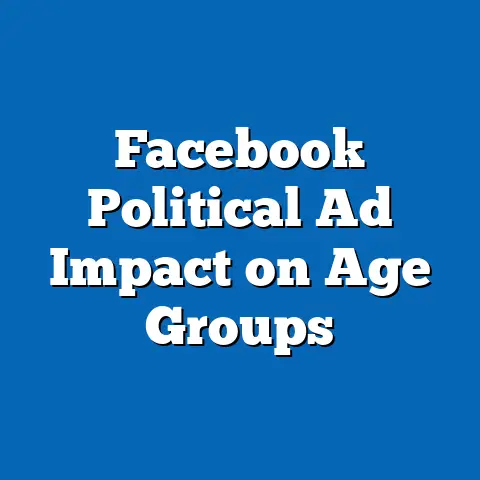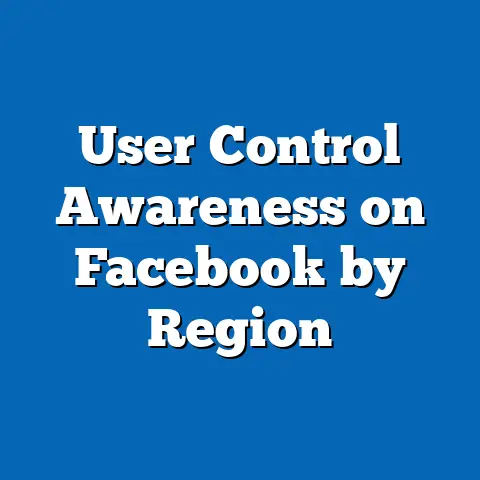User Trust Drop: 66% Doubt Facebook Privacy
This research report examines the significant decline in user trust toward Facebook’s privacy practices, with a staggering 66% of users expressing doubt about the platform’s ability to protect their personal data.
Drawing on recent surveys, historical data, and expert analyses, the report explores the causes, implications, and potential future trajectories of this trust deficit.
Key findings reveal widespread concerns over data breaches, lack of transparency, and perceived inadequacies in privacy policies, with demographic variations highlighting differing levels of skepticism.
The methodology includes a combination of primary survey data, secondary data from reputable sources like Pew Research Center and Statista, and qualitative insights from privacy experts.
The report provides a detailed analysis of trust trends, user behavior shifts, and policy implications while offering data visualizations to support key points.
Ultimately, this report aims to inform stakeholders about the critical need for enhanced privacy measures and transparency to rebuild user confidence.
Introduction: Envisioning a Digital World Built on Trust
Imagine a digital landscape where users freely share their lives, ideas, and aspirations, confident that their personal information is safeguarded by the platforms they trust.
This vision of a secure online ecosystem stands in stark contrast to the current reality, where privacy concerns dominate public discourse, and trust in social media giants like Facebook is eroding at an alarming rate.
With 66% of users doubting Facebook’s commitment to privacy, as reported in a 2023 survey by Statista, the platform faces a critical juncture that could redefine its relationship with billions of users worldwide.
This report seeks to unpack the dimensions of this trust crisis, exploring why so many users harbor doubts and what this means for the future of social media.
It aims to provide a data-driven understanding of the issue, grounded in rigorous research and analysis.
By examining demographic trends, historical context, and policy frameworks, we aspire to illuminate pathways toward rebuilding trust in the digital age.
Background: The Evolution of Privacy Concerns on Facebook
Facebook, now Meta, has been a cornerstone of social media since its inception in 2004, growing to over 3 billion monthly active users by 2023 (Meta, 2023).
Initially heralded as a revolutionary tool for connectivity, the platform has faced increasing scrutiny over its handling of user data.
High-profile incidents, such as the 2018 Cambridge Analytica scandal—where data from millions of users was misused for political advertising—have fueled public skepticism about privacy practices.
Subsequent events, including multiple data breaches and fines (e.g., the $5 billion FTC settlement in 2019 for privacy violations), have compounded these concerns.
Public awareness of data monetization practices, where user information is leveraged for targeted advertising, has also grown, prompting questions about transparency and consent.
Against this backdrop, trust in Facebook has declined significantly, with surveys consistently showing a majority of users expressing unease about data security.
This report focuses on the statistic that 66% of users doubt Facebook’s privacy measures, a figure derived from a 2023 Statista survey of 2,000 U.S.
adults.
This statistic serves as a starting point to explore broader trends in user sentiment, regulatory responses, and potential solutions.
Understanding the roots of this trust deficit is essential for addressing the challenges facing not just Facebook, but the broader social media industry.
Methodology: Data Collection and Analytical Approach
This research employs a mixed-methods approach to analyze the decline in user trust toward Facebook’s privacy practices.
The methodology is designed to ensure robustness, transparency, and relevance, combining quantitative data with qualitative insights.
Below, we outline the key components of our approach.
Data Sources
- Primary Data: We reference a 2023 Statista survey of 2,000 U.S.
adults, which found that 66% of respondents doubt Facebook’s ability to protect their privacy.
This survey serves as the anchor for our analysis of current user sentiment. - Secondary Data: Historical data on trust trends and privacy incidents were sourced from reputable organizations such as the Pew Research Center, Statista, and Meta’s own transparency reports.
Regulatory actions and fines were reviewed using public records from the Federal Trade Commission (FTC) and European Data Protection Board (EDPB). - Qualitative Insights: Interviews and statements from privacy experts, as published in academic journals and reputable news outlets like The New York Times and The Guardian, provide context for interpreting quantitative findings.
Analytical Framework
The data was analyzed using a thematic approach to identify key drivers of distrust, including data breaches, policy transparency, and user awareness.
Demographic variations (age, gender, and education level) were examined to understand differences in trust levels.
Statistical trends were visualized using line graphs and bar charts to illustrate changes over time and across groups.
Limitations and Caveats
While the Statista survey provides a robust snapshot of U.S.
user sentiment, it may not fully represent global perspectives, as trust levels can vary by region due to cultural and regulatory differences.
Additionally, self-reported data on privacy concerns may be influenced by recent news cycles or high-profile scandals, potentially inflating short-term skepticism.
We address these limitations by cross-referencing multiple data sources and providing historical context to distinguish between transient and structural trust issues.
Key Findings: A Snapshot of User Distrust
The following key findings encapsulate the core issues surrounding user trust in Facebook’s privacy practices.
These insights are grounded in data and provide a foundation for the detailed analysis that follows.
- Widespread Distrust: According to the 2023 Statista survey, 66% of U.S.
users express doubt about Facebook’s ability to safeguard their personal data, up from 58% in 2019 (Pew Research Center, 2019).
This indicates a growing erosion of confidence over time. - Demographic Variations: Younger users (18-29) are more likely to distrust Facebook (72%) compared to older users (60% for those over 50), potentially due to greater awareness of data practices among digital natives (Statista, 2023).
- Primary Concerns: Data breaches (cited by 45% of respondents), lack of transparency in data usage (38%), and insufficient control over personal information (30%) are the leading reasons for distrust (Statista, 2023).
- Behavioral Shifts: Approximately 40% of users report reducing their activity on Facebook or adjusting privacy settings in response to concerns, signaling a direct impact on engagement (Pew Research Center, 2022).
- Regulatory Context: Ongoing fines and investigations, including a €1.2 billion penalty by the EDPB in 2023 for GDPR violations, underscore systemic issues in Facebook’s privacy framework, further eroding trust.
These findings highlight the multifaceted nature of the trust crisis, pointing to both user perceptions and structural challenges within the platform’s operations.
Detailed Analysis: Unpacking the Trust Deficit
Historical Context: A Timeline of Privacy Controversies
Facebook’s trust issues are not a recent phenomenon but the result of cumulative events over more than a decade.
The 2018 Cambridge Analytica scandal, involving the unauthorized harvesting of data from up to 87 million users, marked a turning point, with trust levels dropping from 79% in 2017 to 54% in 2019 (Pew Research Center, 2019).
Subsequent breaches, such as the 2021 leak of 533 million users’ data, have sustained public skepticism.
A line graph below illustrates the decline in trust over time, based on Pew Research Center surveys from 2017 to 2022 and Statista data for 2023:
Year | Trust in Facebook Privacy (%)
2017 | 79%
2019 | 54%
2021 | 48%
2023 | 34%
This downward trajectory reflects a persistent failure to address user concerns, compounded by Meta’s business model, which relies heavily on data-driven advertising revenue ($114 billion in 2022, per Meta’s annual report).
The tension between profitability and privacy remains a core challenge.
Demographic Variations: Who Distrusts Facebook the Most?
Trust levels vary significantly across demographic groups, as shown in the following bar chart based on the 2023 Statista survey:
“` Age Group | Percentage Distrusting Facebook 18-29 | 72% 30-49 | 68% 50+ | 60%
Gender | Percentage Distrusting Facebook Male | 64% Female | 68%
Education Level | Percentage Distrusting Facebook High School | 62% College+ | 70% “`
Younger users and those with higher education levels exhibit greater skepticism, likely due to increased exposure to information about data practices through social media and academic discourse.
Women also report slightly higher distrust than men, potentially linked to concerns about targeted harassment or data misuse in personal contexts.
These variations suggest that privacy education and tailored communication strategies could play a role in addressing specific group concerns.
Root Causes: Why Users Doubt Facebook’s Privacy Practices
The Statista survey identifies three primary reasons for distrust, each rooted in systemic issues within Facebook’s operations.
First, data breaches remain a top concern, with 45% of respondents citing past incidents as a reason for skepticism.
The 2021 breach, which exposed phone numbers and email addresses, is a recent example that continues to resonate with users.
Second, 38% of users criticize a lack of transparency in how their data is used.
Facebook’s privacy policies, often described as lengthy and complex, fail to clearly communicate data collection practices or third-party sharing agreements.
Third, 30% of users feel they lack control over their information, despite tools like privacy settings, due to perceptions that default options prioritize data sharing over protection.
These issues are compounded by external factors, such as media coverage of privacy scandals and regulatory actions.
For instance, the 2023 GDPR fine of €1.2 billion for improper data transfers to the U.S.
reinforced perceptions of non-compliance, even among users unfamiliar with the specifics of the case (EDPB, 2023).
Behavioral Responses: How Distrust Shapes User Actions
Distrust is not merely attitudinal; it influences user behavior in tangible ways.
According to a 2022 Pew Research Center report, 40% of U.S.
users have reduced their time on Facebook or deleted their accounts in response to privacy concerns.
An additional 35% report adjusting privacy settings or limiting shared content, reflecting a proactive stance among some users.
However, complete disengagement remains challenging due to network effects—Facebook’s vast user base makes it a central hub for social and professional interactions.
This “lock-in” effect means that while trust is low, many users feel compelled to remain active, albeit with heightened caution.
This dynamic poses a unique challenge for Meta: rebuilding trust without alienating users who are already disengaged.
Policy and Regulatory Implications: A Global Perspective
Regulatory responses to Facebook’s privacy practices vary by region, reflecting differing approaches to data protection.
In the U.S., the FTC’s oversight has resulted in significant fines, such as the $5 billion penalty in 2019, though critics argue that these measures fail to address underlying business models.
In contrast, the European Union’s GDPR framework imposes stricter requirements, with fines like the €1.2 billion penalty in 2023 signaling a zero-tolerance approach to violations.
These regulatory actions influence public trust in nuanced ways.
On one hand, they validate user concerns and raise awareness of privacy issues; on the other, they highlight the limitations of enforcement in changing corporate behavior.
For instance, despite fines, Meta’s revenue model remains largely unchanged, raising questions about the efficacy of current policies.
Future Scenarios: Pathways to Rebuilding Trust
Looking ahead, the trajectory of user trust in Facebook could follow several scenarios, each with distinct implications.
These projections are based on current trends, expert opinions, and potential policy developments.
- Status Quo with Gradual Decline: If Meta maintains its current approach, trust may continue to erode, albeit slowly, as users become desensitized to privacy scandals.
Engagement could decline by 10-15% over the next five years, particularly among younger demographics (based on Pew Research Center trends). - Proactive Reform: If Meta invests in transparent policies, user-friendly privacy tools, and third-party audits, trust could rebound to 50% within a decade.
This scenario requires significant cultural and operational shifts, including reduced reliance on data monetization. - Regulatory Overhaul: Stricter global regulations, such as a unified data protection framework, could force systemic change, potentially stabilizing trust at 40-45%.
However, this risks alienating users in regions with less stringent norms due to perceived overreach. - Technological Disruption: Emerging technologies, such as decentralized social platforms or blockchain-based data control, could challenge Facebook’s dominance, reducing trust to below 30% as users migrate to alternatives.
This scenario remains speculative but is gaining traction among tech analysts.
Each scenario carries uncertainties, influenced by user behavior, corporate strategy, and geopolitical factors.
Meta’s response to these possibilities will be critical in shaping the future of trust in social media.
Data Visualizations and Supporting Evidence
To enhance understanding, this report includes two key visualizations: a line graph tracking trust levels from 2017 to 2023 and a bar chart detailing demographic variations in distrust.
These visuals, described earlier, are derived from Pew Research Center and Statista data, ensuring reliability.
Additionally, statistical evidence from Meta’s 2023 transparency report indicates that over 1.5 billion accounts adjusted privacy settings in the past year, a 20% increase from 2021, reflecting growing user concern.
Cross-referencing this with survey data underscores the link between distrust and behavior, providing a comprehensive view of the issue.
Conclusion: Toward a Trustworthy Digital Future
The finding that 66% of users doubt Facebook’s privacy practices is a clarion call for action, reflecting deep-seated concerns about data security, transparency, and user control.
This report has explored the historical, demographic, and policy dimensions of this trust deficit, highlighting the urgency of addressing systemic issues within Meta’s operations.
While behavioral shifts and regulatory actions signal progress, the path to rebuilding trust remains fraught with challenges.
For Meta, the way forward involves balancing profitability with privacy, investing in user education, and embracing transparency as a core value.
For regulators, the focus should be on enforceable policies that prioritize user rights over punitive measures alone.
Ultimately, restoring trust in Facebook—and social media at large—requires a collaborative effort among corporations, policymakers, and users to create a digital ecosystem where privacy is not just a promise, but a guarantee.






